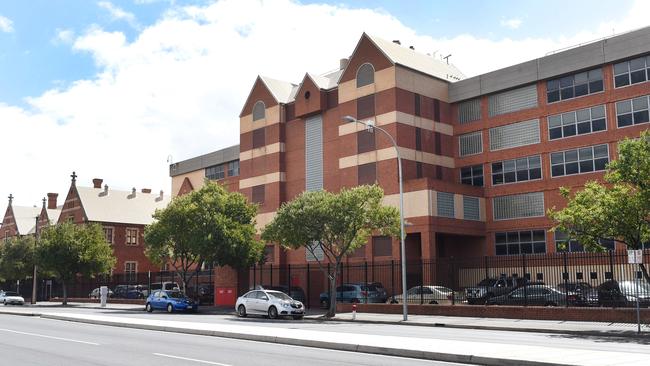Senior bikie jailed indefinitely for contempt after refusing to answer Australian Criminal Intelligence Commission questions
IN a legal first in South Australia a senior bikie gang member has been jailed indefinitely for refusing to answer questions at an Australian Criminal Intelligence Commission coercive hearing.
IN a South Australian legal first, a senior bikie gang member has been jailed indefinitely for refusing to answer six questions at an Australian Criminal Intelligence Commission coercive hearing.
The bikie, who is an office bearer in the well-known gang, has been found guilty of contempt by Federal Court Justice Richard White and will remain in the Adelaide Remand Centre until he “purges’’ his contempts by answering the questions.
The six questions the man refused to answer concern the ownership of six mobile phones and BlackBerry devices found during a search of his northern suburbs house by ACIC officers.
The bikie, who cannot be identified because of secrecy provisions that surround the coercive hearings, has been a major player in the illicit drug industry in SA for several decades.
He has served several lengthy prison terms for drug offences — the latest a six-year stint following his 2004 conviction for trafficking.
The man and several of his close associates are targets in an ongoing ACIC intelligence operation aime at outlaw motorcycle gang members involved in drug-related crime.
As part of the operation the ACIC uses the coercive hearings, at which those summonsed are compelled to answer questions posed by an examiner, or else they are in contempt.
ACIC chief executive officer Michael Phelan told The Advertiser the coercive hearings “are an important tool in the fight against transnational serious and organised crime.’’
“We will ensure individuals or organisations that fail to comply with a lawful director of the examiner are held to account,’’ he said.

Federal Court documents reveal the man was served with a summons at 8.15am on June 6 this year, ordering him to appear at a coercive hearing at 11am that day. At the same time a search warrant was executed at his home during which the six devices were seized.
While the man did appear at the hearing, prior to being questioned his solicitor said he would not be answering any questions “because he feels that he has been put in danger.’’
He said those fears arose from the manner in which the summons had been served on the man.
While the man answered questions concerning his identity, he refused to answer six further questions concerning four mobile phones and two BlackBerry devices found during the search of his home.
In 2016 The Advertiser revealed Adelaide bikie gang members were using the encrypted BlackBerry devices to communicate with one another — thwarting legislation that bans them from doing so.
Following his refusals the man was charged with six counts of contempt and was due to face trial on October 5 in the Federal Court, but on October 3 his senior counsel Lindy Powell QC informed the court he would plead guilty.

In sentencing submissions Ms Powell said the man had concerns for his safety that arose from a similar event in September 2016 when he was also served with an ACIC summons — on that occasion in front of fellow gang members, to attend a coercive hearing.
On that occasion the man said he feared for his safety from other gang members who had asked him if he had been talking to the ACIC.
As a result of those fears, the hearing was adjourned and the man was later discharged from complying with that summons.
Ms Powell said between 2016 and June 6 this year he had periodically been asked by fellow gang members if the ACIC had been back to see him.
However, this was rejected by Justice White, who said “there is no positive evidence’’ from the man that he had been concerned for his own safety or that of his family, only an inference drawn from the 2016 matter.
He said the only evidence that anyone observed ACIC officers at the man’s house on June 6 was that a neighbour opened her apartment door and there was no suggestion she was connected to the man’s bikie gang.
“There is no basis upon which to conclude that anyone else with an interest in the respondent was present, or even possibly present, in a position to have observed the execution of the warrant and the service of the summons,’’ Justice White stated.
The man had in fact been served with the summons in the privacy of his bedroom with no other person present.
In sentencing the man Justice White said his actions “must be regarded seriously’’ and they had undermined the process put in place for obtaining criminal intelligence.
“The obligations imposed on the respondent by the ACC Act override any private undertakings or code of conduct adopted by the respondent in his motorcycle club,’’ he said.
“Even now he has not chosen to purge his contempt, let alone make any expression of regret or contrition.’’
Justice White ordered the man be imprisoned until further order, but included liberty to apply in his order “in the event the respondent does purge his contempts, there will be the opportunity for the continuation of the respondent’s imprisonment to be reviewed”.
Mr Phelan said the ACIC’s coercive powers were used in special operations and special investigations “to obtain information where traditional law enforcement methods are unlikely to be or have not been effective.’’
During the 2017/18 fiancial year the ACIC conducted 212 coercive examinations that yielded new information about crime related to both special operations and special investigations.
